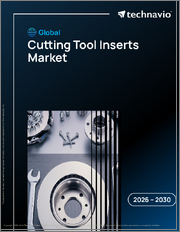
|
시장보고서
상품코드
1722577
툴링 시장 보고서 : 유형, 재료 유형, 최종 용도, 지역별(2025-2033년)Tooling Market Report by Type, Material, End Use, and Region 2025-2033 |
||||||
세계 툴링 시장 규모는 2024년 2,727억 달러에 달했습니다. 향후 IMARC Group은 2033년까지 4,838억 달러에 달할 것으로 예상하며, 2025년부터 2033년까지 6.6%의 연평균 성장률(CAGR)을 기록할 것으로 예측합니다. 이 시장은 지속적인 기술 발전과 인더스트리 4.0의 통합, 복잡한 툴링 부품의 신속한 프로토타이핑 및 생산을 위한 적층 가공의 광범위한 채택, 다양한 산업에서 툴링에 대한 수요 증가로 인해 완만한 성장세를 보이고 있습니다.
툴링 시장 분석:
시장 성장과 규모 : 툴링 세계 시장은 전 세계 산업화와 제조 활동의 증가로 인해 완만한 성장세를 보이고 있습니다. 또한, 자동차 산업의 매출이 증가하고 있는 것도 좋은 시장 전망을 가져오고 있습니다.
기술 발전 : 사물인터넷(IoT), 인공지능(AI), 자동화의 통합으로 제조 공정이 개선되고 정확성과 효율성이 향상되고 있습니다.
산업 용도 : 툴링의 용도는 자동차, 전자, 항공우주, 해양 및 방위, 플라스틱, 건설 및 광업 등 다양한 산업 분야에 걸쳐 있습니다. 각 산업 분야는 고유한 요구사항에 맞는 툴링 전문 솔루션이 필요하며, 자동차는 가장 큰 시장 점유율을 가지고 있습니다.
지리적 동향 : 현재 유럽이 시장을 주도하고 있습니다. 그러나 중동 및 아프리카는 산업화 노력으로 가장 빠르게 성장하는 신흥 시장 중 하나입니다.
경쟁 상황 : 툴링 시장은 경쟁이 치열하며, 주요 업체들은 기술 혁신과 고객 중심의 접근 방식을 중시하고 있습니다.
도전과 기회 : 툴링 시장의 도전과제는 환경 규제의 진화, 지속가능한 관행의 필요성, 경쟁의 심화 등이 있습니다. 주요 기업들은 재생에너지, 전기자동차 등 신흥 산업에 특화된 툴링 솔루션 도입에 집중함으로써 이러한 과제를 극복하고 기존 소비자 기반을 확대하는 데 주력하고 있습니다.
향후 전망 : 세계 툴링 시장은 산업계가 정밀 제조를 위한 첨단 솔루션을 지속적으로 추구함에 따라 미래가 유망할 것으로 보입니다. 이 시장은 신흥 산업의 확대, 자동화 발전, 지속가능한 관행에 대한 관심 증가로 인해 지속적인 성장이 예상됩니다.
툴링 시장 동향:
기술 발전
지속적인 기술 발전과 제조 공정에 디지털 기술의 통합을 특징으로 하는 인더스트리 4.0의 통합은 시장 성장에 유리한 주요 요인 중 하나입니다. 또한, 사물인터넷(IoT)은 실시간 데이터 수집 및 분석을 통해 제조업체가 툴링의 성능을 모니터링하고, 유지보수 필요성을 예측하고, 제조 공정을 최적화할 수 있게 해줍니다. 또한 커넥티드 툴링 장비는 원격 모니터링 및 제어를 용이하게 하여 전반적인 효율성을 높이고 다운타임을 줄일 수 있습니다. 이에 따라 적층 가공은 복잡한 금형 부품의 신속한 프로토타이핑 및 생산에 적층 가공이 널리 채택되어 시장 전망이 좋으며, 3 차원 3D 프린팅을 통해 금형 기업은 맞춤형 복잡한 디자인을 만들고 리드 타임과 제조 비용을 절감 할 수 있습니다. 리드 타임과 제조 비용을 절감할 수 있습니다. 또한, 경량 및 고강도 툴링 솔루션의 개발도 용이해집니다. 또한, 로봇 시스템은 자재 취급, 공구 교환, 품질 검사 등의 작업에 점점 더 많이 사용되고 있습니다. 이러한 자동화를 통해 생산이 간소화되고, 정확도가 향상되며, 수작업의 필요성이 감소합니다.
신흥 산업에서의 수요 확대
신흥 산업에서 툴링에 대한 수요가 증가함에 따라 시장 성장이 강화되고 있습니다. 신흥 산업은 고유한 제조 요구를 충족시키기 위해 특수하고 정밀한 툴링 솔루션을 필요로 하는 경우가 많습니다. 또한, 재생에너지 분야, 특히 풍력 및 태양광발전의 터빈 블레이드 및 태양광 패널과 같은 부품 제조에서 특수 툴링에 대한 의존도가 높아지고 있는 것도 시장 전망을 밝게 하고 있습니다. 이와는 별도로, 전기자동차(EV) 판매량의 증가는 배터리 및 전기 구동계를 포함한 EV 부품 제조에 최적화된 툴링 솔루션에 대한 수요를 불러일으키고 있습니다. 또한, 세계 안보에 대한 관심이 높아지고 항공기의 지속적인 증가로 인해 항공기 부품 및 방위 시스템 제조에 대한 고정밀 툴링의 필요성이 증가하고 있습니다. 이에 따라 수술기구, 임플란트, 의료기기 제조를 위한 헬스케어 분야에서의 툴링 활용이 증가하고 있는 것도 시장 성장을 뒷받침하고 있습니다.
지속가능성과 환경 친화적인 툴링에 대한 주목
툴링 제조업체들이 환경 친화적인 방법과 재료를 채택하는 데 집중하는 경향이 증가하고 있으며, 이는 시장에 긍정적인 영향을 미치고 있습니다. 또한, 엄격한 환경 규제와 배출량 목표의 시행으로 산업계는 탄소 배출량을 줄이도록 장려하고 있습니다. 툴링 기업들은 지속가능한 제조 공정과 재료를 개발하고 있습니다. 또한 폐기물을 줄이고 환경에 미치는 영향을 최소화하기 위해 재활용 재료의 사용과 순환 경제의 원칙을 채택하여 폐기물을 줄이고 환경에 미치는 영향을 최소화하기 위해 노력하고 있습니다. 이에 따라 자동차 및 항공우주 산업 등에서는 연료 소비를 줄이기 위해 복합재료 및 알루미늄과 같은 경량 재료로 전환하고 있으며, 이러한 재료에 최적화된 혁신적인 툴링 솔루션의 필요성이 증가하고 있습니다. 또한, 보다 효율적인 제조 공정에 기여하고 지속가능성 목표에 부합하는 솔루션에 대한 수요 증가가 시장을 주도하고 있습니다. 또한, AI 및 예지보전과 같은 첨단 툴링 기술의 개발은 생산에서 폐기물과 결함을 최소화하고 자원 낭비와 에너지 소비를 줄이는 데 도움이 될 것입니다.
목차
제1장 서문
제2장 조사 범위와 조사 방법
- 조사 목적
- 이해관계자
- 데이터 소스
- 1차 정보
- 2차 정보
- 시장 추정
- 상향식 접근
- 하향식 접근
- 조사 방법
제3장 주요 요약
제4장 소개
- 개요
- 주요 업계 동향
제5장 세계의 툴링 시장
- 시장 개요
- 시장 실적
- COVID-19의 영향
- 시장 예측
제6장 시장 내역 : 제품 유형별
- 금형
- 단조
- 치구와 고정구
- 기계 공구
- 게이지
제7장 시장 내역 : 재료 유형별
- 스테인리스강
- 철
- 알루미늄
- 기타
제8장 시장 내역 : 최종 이용 산업별
- 자동차
- 전자공학과 전기 공학
- 항공우주, 해양, 방위
- 플라스틱 산업
- 건설과 광업
- 기타
제9장 시장 내역 : 지역별
- 북미
- 미국
- 캐나다
- 아시아태평양
- 중국
- 일본
- 인도
- 한국
- 호주
- 인도네시아
- 기타
- 유럽
- 독일
- 프랑스
- 영국
- 이탈리아
- 스페인
- 러시아
- 기타
- 라틴아메리카
- 브라질
- 멕시코
- 기타
- 중동 및 아프리카
- 시장 내역 : 국가별
제10장 SWOT 분석
- 개요
- 강점
- 약점
- 기회
- 위협
제11장 밸류체인 분석
제12장 Porter's Five Forces 분석
- 개요
- 구매자의 교섭력
- 공급 기업의 교섭력
- 경쟁 정도
- 신규 참여업체의 위협
- 대체품의 위협
제13장 가격 분석
제14장 경쟁 구도
- 시장 구조
- 주요 기업
- 주요 기업 개요
- Agathon AG
- Bharat Forge Limited
- Carlson Tool & Manufacturing Corp.
- Doosan Machine Tools Co. Ltd.(DTR Automotive)
- Godrej & Boyce Manufacturing Co. Ltd.
- Omega Tool Corp
- Samvardhana Motherson Group
- Sandvik AB
- Siemens AG
- Stratasys Direct Inc.
- Unique Tool & Gauge Inc.
- Yamazaki Mazak Corporation
The global tooling market size reached USD 272.7 Billion in 2024. Looking forward, IMARC Group expects the market to reach USD 483.8 Billion by 2033, exhibiting a growth rate (CAGR) of 6.6% during 2025-2033. The market is experiencing moderate growth driven by continuous technological advancements and the integration of Industry 4.0, the widespread adoption of additive manufacturing for the rapid prototyping and production of complex tooling components, and the escalating demand for tooling in various industries.
Tooling Market Analysis:
Market Growth and Size: The global tooling market has experienced moderate growth due to the increasing industrialization and manufacturing activities worldwide. The increasing sales of the automotive industry is also offering a favorable market outlook.
Technological Advancements: Integration of the Internet of Things (IoT), artificial intelligence (AI), and automation are improving manufacturing processes, enhancing precision and efficiency.
Industry Applications: Tooling applications span across diverse industries, such as automotive, electronics, aerospace, marine and defense, plastics, and construction and mining. Each sector requires specialized tooling solutions tailored to meet their unique requirements with automotive being the largest market share holder.
Geographical Trends: Europe is currently enjoying the leading position market. Nonetheless, Middle East and Africa are one of the fastest-growing emerging markets, which are driven by industrialization efforts.
Competitive Landscape: The tooling market is highly competitive with key players relying on innovation and customer-centric approaches.
Challenges and Opportunities: Challenges in the tooling market include evolving environmental regulations, need for sustainable practices, and increasing competition. The key players are consequently focusing on the introduction of specialized tooling solutions in emerging industries, such as renewable energy and electric vehicles, to overcome challenges and expand their existing consumer-base.
Future Outlook: The future of the global tooling market appears promising as industries continue to seek advanced solutions for precision manufacturing. The market is expected to witness sustained growth, driven by the expansion of emerging industries, increasing automation, and the growing focus on sustainable practices.
Tooling Market Trends:
Technological Advancements
Continuous technological advancements and the integration of Industry 4.0, characterized by the integration of digital technologies into manufacturing processes, represent one of the primary factors favoring the market growth. Additionally, the Internet of Things (IoT) is enabling real-time data collection and analysis, allowing manufacturers to monitor tooling performance, predict maintenance needs, and optimize production processes. Along with this, connected tooling equipment facilitates remote monitoring and control, enhancing overall efficiency and reducing downtime. In line with this, the widespread adoption of additive manufacturing for the rapid prototyping and production of complex tooling components is offering a favorable market outlook. Three-dimensional 3D printing enables tooling companies to create customized, intricate designs, reducing lead times and production costs. It also facilitates the development of lightweight yet high-strength tooling solutions. Furthermore, robotic systems are increasingly used for tasks like material handling, tool changing, and quality inspection. This automation streamlines production, enhances precision, and reduces the need for manual labor.
Growing Demand in Emerging Industries
The escalating demand for tooling from emerging industries is strengthening the growth of the market. These industries often require specialized and precise tooling solutions to support their unique manufacturing needs. In addition, the increasing reliance of the renewable energy sector, particularly wind and solar power, on specialized tooling for the manufacturing of components like turbine blades and solar panels is creating a positive outlook for the market. Apart from this, rising sales of electric vehicles (EVs) are catalyzing the demand for tooling solutions optimized for the production of EV components, including batteries and electric drivetrains. Furthermore, the growing global security concerns and the continuous rise in air travel are driving the need for high-precision tooling for manufacturing aircraft components and defense systems. In line with this, the increasing utilization of tooling in the healthcare sector for producing surgical instruments, implants, and medical equipment is supporting the growth of the market.
Focus on Sustainability and Eco-Friendly Tooling
Rising focus of tooling manufacturers to adopt eco-friendly practices and materials is influencing the market positively. In addition, the implementation of stringent environmental regulations and emissions targets is encouraging industries to reduce their carbon footprint. Tooling companies are developing sustainable manufacturing processes and materials. They are also exploring the use of recycled materials and adopting circular economy principles to reduce waste and minimize the environmental impact of their operations. Along with this, the rising shift towards lightweight materials, such as composites and aluminum, in industries like automotive and aerospace is reducing fuel consumption and driving the need for innovative tooling solutions optimized for these materials. Furthermore, the escalating demand for solutions that contribute to more efficient manufacturing processes and align with sustainability goals is driving the market. Moreover, the development of advanced tooling technologies, like AI and predictive maintenance, helps minimize scrap and defects in production, reducing resource waste and energy consumption.
Tooling Industry Segmentation:
Breakup by Product Type:
- Dies and Molds
- Forging
- Jigs and Fixtures
- Machines Tools
- Gauges
Dies and molds account for the majority of the market share
Dies are precision tools used for cutting or forming materials and molds and shaping materials like plastics, metals, and composites. Dies and molds find extensive applications in industries, such as automotive, aerospace, and consumer goods manufacturing. They enable the mass production of components with high precision and consistency. Tooling companies specializing in dies and molds emphasize their expertise in designing and manufacturing these critical tools, positioning themselves as leaders in providing solutions that ensure efficient and high-quality production processes.
Forging is a process that involves shaping metal by applying compressive forces. It is widely utilized in industries like automotive, aerospace, and construction. Forging tools include hammers, presses, and dies used to form metal into desired shapes. Companies specializing in forging tools highlight their ability to produce durable and high-strength components for various applications. Their expertise lies in providing forging solutions that meet the stringent requirements of industries where structural integrity and reliability are paramount.
Jigs and fixtures are used in manufacturing for guiding and holding workpieces during machining, assembly, or inspection processes. They ensure precise and repeatable positioning of components, contributing to increased productivity and quality. Jigs and fixtures find applications in industries ranging from aerospace to electronics manufacturing.
Machine tools are versatile equipment used for shaping, cutting, drilling, and finishing materials like metal, wood, and composites. They are indispensable in a wide range of industries, including automotive, aerospace, and metalworking. Machine tools include lathes, milling machines, grinders, and computer numerical control (CNC) machines. Companies specializing in machine tools highlight their expertise in manufacturing reliable and high-performance equipment that enhances precision and productivity in various manufacturing processes.
Breakup by Material Type:
- Stainless Steel
- Iron
- Aluminum
- Others
Stainless steel tooling finds numerous applications across various industries due to its exceptional durability, corrosion resistance, and high strength. Additionally, its resistance to rust and staining makes it ideal for tooling components exposed to harsh environments or chemicals. Apart from this, its hardness allows for the creation of sharp cutting edges and molds, ensuring precise and consistent results.
Iron is widely used in automotive manufacturing and heavy machinery production due to its ability to absorb and dissipate heat effectively. Additionally, the increasing construction and remodeling of residential and commercial buildings is driving the demand for iron. Along with this, companies specializing in iron tooling are increasingly focusing on its cost-effectiveness and suitability for applications requiring strength and durability.
Aluminum tooling is valued for its lightweight properties, excellent thermal conductivity, and versatility. Additionally, the ease of machining and low density makes it an excellent choice for tooling components that require intricate designs and rapid production. Along with this, companies specializing in aluminum tooling emphasize its adaptability and efficiency.
Breakup by End Use Industry:
- Automotive
- Electronics and Electrical
- Aerospace, Marine and Defense
- Plastics Industry
- Construction and Mining
- Others
Automotive represents the leading market segment
The automotive industry is the largest consumer of tooling products and holds a significant market share. Tooling in this sector encompasses a wide range of applications, including the production of automotive components, such as engine parts, body panels, and precision molds for plastic and composite materials. Additionally, companies operating in this domain emphasize their expertise in automotive tooling and focus on delivering innovative and reliable solutions that drive the automotive industry forward.
The electronics and electrical industry relies heavily on tooling for the production of circuit boards, semiconductor components, connectors, and other precision parts. Tooling companies specializing in electronics and electrical applications emphasize their ability to provide intricate and highly accurate tooling solutions, catering to the ever-evolving demands of this fast-paced industry.
Tooling in the aerospace sector is widely used to produce aircraft components, including fuselages, wings, and engine parts. Furthermore, companies in this segment position themselves as experts in aerospace tooling, highlighting their capabilities in manufacturing complex and high-performance components that meet stringent aerospace industry requirements.
The marine and defense industry relies on tooling for the manufacturing of naval vessels, military equipment, and defense systems. Tooling solutions in this sector must meet rigorous durability and reliability standards. Companies specializing in marine and defense tooling underscore their expertise in providing robust and dependable solutions, contributing to the security and strength of these industries.
The increasing utilization of tooling in the plastics industry is enabling the production of various plastic components and products, from packaging materials to automotive parts. Precision molds, dies, and extrusion tools are used to achieve consistent and high-quality output. Moreover, companies in this segment emphasize their proficiency in designing and manufacturing tooling solutions that enhance the efficiency and cost-effectiveness of plastic manufacturing processes.
Tooling is used in the marine and construction industry for producing heavy machinery, equipment components, and construction materials as it offers durability, ruggedness, and resistance to wear and tear. Companies specializing in construction and mining tooling highlight their expertise in delivering robust and reliable solutions that withstand the demanding conditions of these industries, contributing to efficient and safe operations.
Breakup by Region:
- North America
- United States
- Canada
- Asia-Pacific
- China
- Japan
- India
- South Korea
- Australia
- Indonesia
- Others
- Europe
- Germany
- France
- United Kingdom
- Italy
- Spain
- Russia
- Others
- Latin America
- Brazil
- Mexico
- Others
- Middle East and Africa
Europe leads the market, accounting for the largest tooling market share
The market research report has also provided a comprehensive analysis of all the major regional markets, which include North America (the United States and Canada); Asia Pacific (China, Japan, India, South Korea, Australia, Indonesia, and others); Europe (Germany, France, the United Kingdom, Italy, Spain, Russia, and others); Latin America (Brazil, Mexico, and others); and the Middle East and Africa. According to the report, Europe accounted for the largest market share.
Europe maintains a strong presence in the global tooling market. Germany, known for its engineering prowess, leads the region with high-quality precision tooling. France, the United Kingdom, and Italy also contribute significantly, driven by diverse manufacturing sectors. Spain and Russia, with the growing industrial bases, are increasingly adopting advanced tooling solutions, while other European countries are also contributing to the development of niche markets.
North America, particularly the United States, holds a substantial share in the global tooling market due to the presence of a robust manufacturing sector, advanced technology adoption, and the escalating demand for precision tooling. The United States, as a manufacturing powerhouse, relies on cutting-edge tooling solutions to maintain its competitiveness. Apart from this, the development of automotive and aerospace industries in Canada is contributing to the growth of the market.
Asia Pacific is a dominant force in the market as many of the countries are home to thriving industrial sector. Japan is renowned for its precision engineering, making it a key player in high-precision tooling. Additionally, the burgeoning manufacturing and automotive sectors in India are contributing to the regional market growth. Moreover, rapid industrialization and the increasing adoption of advanced technologies in South Korea, Australia, and Indonesia are supporting the market growth.
Latin America, led by Brazil and Mexico, is experiencing steady growth in the tooling market. The expansion of automotive and aerospace industries in the region is driving the demand for tooling, while Mexico benefits from its proximity to the United States and its role as a manufacturing hub. Apart from this, several other countries in the region are gradually adopting modern tooling solutions to meet the escalating demand for precision tooling across several industries.
Rapid industrialization and infrastructure development are supporting the growth of the tooling market in the Middle East and Africa. Additionally, several countries in the Middle East, such as the United Arab Emirates and Saudi Arabia, are actively investing in diversifying their economies away from oil dependency. This includes establishing manufacturing and industrial hubs.
Leading Key Players in the Tooling Industry:
The key market players in the market are continually adapting to meet industry demands. These industry leaders are investing in research and development (R&D) activities to enhance product innovation, focusing on precision engineering and sustainability. Additionally, they are expanding their global presence through strategic partnerships and acquisitions to offer comprehensive solutions to their clients. Apart from this, many companies are increasingly integrating several digital technologies, such as the Internet of Things (IoT) and artificial intelligence (AI), to optimize production processes and provide data-driven insights. This digitalization optimizes production processes and provides valuable data-driven insights for clients, empowering them to make informed decisions.
The market research report has provided a comprehensive analysis of the competitive landscape. Detailed profiles of all major companies have also been provided. Some of the key players in the market include:
- Agathon AG
- Bharat Forge Limited
- Carlson Tool & Manufacturing Corp.
- Doosan Machine Tools Co. Ltd. (DTR Automotive)
- Godrej & Boyce Manufacturing Co. Ltd.
- Omega Tool Corp
- Samvardhana Motherson Group
- Sandvik AB
- Siemens AG
- Stratasys Direct Inc.
- Unique Tool & Gauge Inc.
- Yamazaki Mazak Corporation
Key Questions Answered in This Report
- 1.What was the size of the global tooling market in 2024?
- 2.What is the expected growth rate of the global tooling market during 2025-2033?
- 3.What has been the impact of COVID-19 on the global tooling market?
- 4.What are the key factors driving the global tooling market?
- 5.What is the breakup of the global tooling market based on the product type?
- 6.What is the breakup of the global tooling market based on the end use industry?
- 7.What are the key regions in the global tooling market?
- 8.Who are the key players/companies in the global tooling market?
Table of Contents
1 Preface
2 Scope and Methodology
- 2.1 Objectives of the Study
- 2.2 Stakeholders
- 2.3 Data Sources
- 2.3.1 Primary Sources
- 2.3.2 Secondary Sources
- 2.4 Market Estimation
- 2.4.1 Bottom-Up Approach
- 2.4.2 Top-Down Approach
- 2.5 Forecasting Methodology
3 Executive Summary
4 Introduction
- 4.1 Overview
- 4.2 Key Industry Trends
5 Global Tooling Market
- 5.1 Market Overview
- 5.2 Market Performance
- 5.3 Impact of COVID-19
- 5.4 Market Forecast
6 Market Breakup by Product Type
- 6.1 Dies and Molds
- 6.1.1 Market Trends
- 6.1.2 Market Forecast
- 6.2 Forging
- 6.2.1 Market Trends
- 6.2.2 Market Forecast
- 6.3 Jigs and Fixtures
- 6.3.1 Market Trends
- 6.3.2 Market Forecast
- 6.4 Machines Tools
- 6.4.1 Market Trends
- 6.4.2 Market Forecast
- 6.5 Gauges
- 6.5.1 Market Trends
- 6.5.2 Market Forecast
7 Market Breakup by Material Type
- 7.1 Stainless Steel
- 7.1.1 Market Trends
- 7.1.2 Market Forecast
- 7.2 Iron
- 7.2.1 Market Trends
- 7.2.2 Market Forecast
- 7.3 Aluminum
- 7.3.1 Market Trends
- 7.3.2 Market Forecast
- 7.4 Others
- 7.4.1 Market Trends
- 7.4.2 Market Forecast
8 Market Breakup by End Use Industry
- 8.1 Automotive
- 8.1.1 Market Trends
- 8.1.2 Market Forecast
- 8.2 Electronics and Electrical
- 8.2.1 Market Trends
- 8.2.2 Market Forecast
- 8.3 Aerospace, Marine and Defense
- 8.3.1 Market Trends
- 8.3.2 Market Forecast
- 8.4 Plastics Industry
- 8.4.1 Market Trends
- 8.4.2 Market Forecast
- 8.5 Construction and Mining
- 8.5.1 Market Trends
- 8.5.2 Market Forecast
- 8.6 Others
- 8.6.1 Market Trends
- 8.6.2 Market Forecast
9 Market Breakup by Region
- 9.1 North America
- 9.1.1 United States
- 9.1.1.1 Market Trends
- 9.1.1.2 Market Forecast
- 9.1.2 Canada
- 9.1.2.1 Market Trends
- 9.1.2.2 Market Forecast
- 9.1.1 United States
- 9.2 Asia-Pacific
- 9.2.1 China
- 9.2.1.1 Market Trends
- 9.2.1.2 Market Forecast
- 9.2.2 Japan
- 9.2.2.1 Market Trends
- 9.2.2.2 Market Forecast
- 9.2.3 India
- 9.2.3.1 Market Trends
- 9.2.3.2 Market Forecast
- 9.2.4 South Korea
- 9.2.4.1 Market Trends
- 9.2.4.2 Market Forecast
- 9.2.5 Australia
- 9.2.5.1 Market Trends
- 9.2.5.2 Market Forecast
- 9.2.6 Indonesia
- 9.2.6.1 Market Trends
- 9.2.6.2 Market Forecast
- 9.2.7 Others
- 9.2.7.1 Market Trends
- 9.2.7.2 Market Forecast
- 9.2.1 China
- 9.3 Europe
- 9.3.1 Germany
- 9.3.1.1 Market Trends
- 9.3.1.2 Market Forecast
- 9.3.2 France
- 9.3.2.1 Market Trends
- 9.3.2.2 Market Forecast
- 9.3.3 United Kingdom
- 9.3.3.1 Market Trends
- 9.3.3.2 Market Forecast
- 9.3.4 Italy
- 9.3.4.1 Market Trends
- 9.3.4.2 Market Forecast
- 9.3.5 Spain
- 9.3.5.1 Market Trends
- 9.3.5.2 Market Forecast
- 9.3.6 Russia
- 9.3.6.1 Market Trends
- 9.3.6.2 Market Forecast
- 9.3.7 Others
- 9.3.7.1 Market Trends
- 9.3.7.2 Market Forecast
- 9.3.1 Germany
- 9.4 Latin America
- 9.4.1 Brazil
- 9.4.1.1 Market Trends
- 9.4.1.2 Market Forecast
- 9.4.2 Mexico
- 9.4.2.1 Market Trends
- 9.4.2.2 Market Forecast
- 9.4.3 Others
- 9.4.3.1 Market Trends
- 9.4.3.2 Market Forecast
- 9.4.1 Brazil
- 9.5 Middle East and Africa
- 9.5.1 Market Trends
- 9.5.2 Market Breakup by Country
- 9.5.3 Market Forecast
10 SWOT Analysis
- 10.1 Overview
- 10.2 Strengths
- 10.3 Weaknesses
- 10.4 Opportunities
- 10.5 Threats
11 Value Chain Analysis
12 Porters Five Forces Analysis
- 12.1 Overview
- 12.2 Bargaining Power of Buyers
- 12.3 Bargaining Power of Suppliers
- 12.4 Degree of Competition
- 12.5 Threat of New Entrants
- 12.6 Threat of Substitutes
13 Price Analysis
14 Competitive Landscape
- 14.1 Market Structure
- 14.2 Key Players
- 14.3 Profiles of Key Players
- 14.3.1 Agathon AG
- 14.3.1.1 Company Overview
- 14.3.1.2 Product Portfolio
- 14.3.2 Bharat Forge Limited
- 14.3.2.1 Company Overview
- 14.3.2.2 Product Portfolio
- 14.3.2.3 Financials
- 14.3.3 Carlson Tool & Manufacturing Corp.
- 14.3.3.1 Company Overview
- 14.3.3.2 Product Portfolio
- 14.3.4 Doosan Machine Tools Co. Ltd. (DTR Automotive)
- 14.3.4.1 Company Overview
- 14.3.4.2 Product Portfolio
- 14.3.5 Godrej & Boyce Manufacturing Co. Ltd.
- 14.3.5.1 Company Overview
- 14.3.5.2 Product Portfolio
- 14.3.6 Omega Tool Corp
- 14.3.6.1 Company Overview
- 14.3.6.2 Product Portfolio
- 14.3.7 Samvardhana Motherson Group
- 14.3.7.1 Company Overview
- 14.3.7.2 Product Portfolio
- 14.3.7.3 Financials
- 14.3.8 Sandvik AB
- 14.3.8.1 Company Overview
- 14.3.8.2 Product Portfolio
- 14.3.8.3 Financials
- 14.3.8.4 SWOT Analysis
- 14.3.9 Siemens AG
- 14.3.9.1 Company Overview
- 14.3.9.2 Product Portfolio
- 14.3.9.3 Financials
- 14.3.9.4 SWOT Analysis
- 14.3.10 Stratasys Direct Inc.
- 14.3.10.1 Company Overview
- 14.3.10.2 Product Portfolio
- 14.3.11 Unique Tool & Gauge Inc.
- 14.3.11.1 Company Overview
- 14.3.11.2 Product Portfolio
- 14.3.12 Yamazaki Mazak Corporation
- 14.3.12.1 Company Overview
- 14.3.12.2 Product Portfolio
- 14.3.1 Agathon AG



















